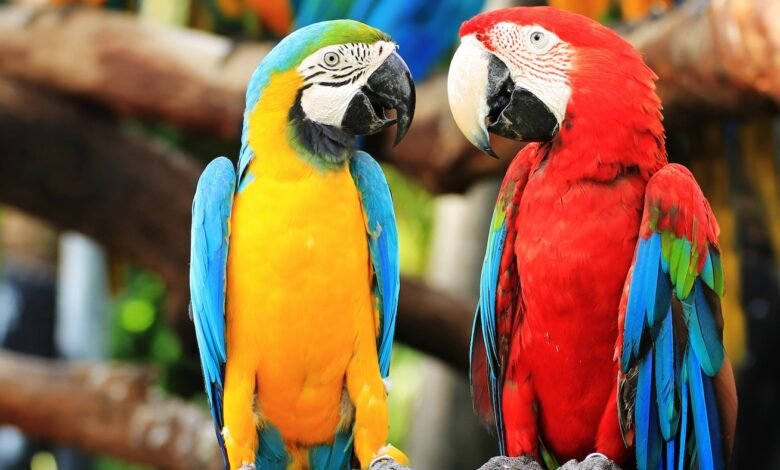
Care & SafetyFeaturedNew Pet ParentPet NewsTraining
Parrot Care Tips
Parrot are very clever birds that make excellent pets, but there are certain things you should know about them and their care requirements before deciding to buy one. First, because parrots are wild by nature and not domesticated (like dogs and cats), they maintain many of their wild counterparts’ habits and instincts. Next, because parrots are not all the same species, you will need to study the characteristics of your specific parrot species before purchasing one. Finally, parrot care outlives most other pets: smaller species (cockatiels or parrotlets) can live 20-30 years, while bigger species (macaws, amazons, or cockatoos) can live 60-80 years.
Preparing a Parrot Home
- Obtain a proper cage – Square or rectangular cages are more appropriate for parrots; they feel unsafe in round cages that do not have corners. Ensure your cage is large enough for your parrot to climb and move comfortably in. Cages should have enough room for perches, toys, food bowls, water bowls, and rest areas.
- Place the cage in a room where he can interact – Parrots are social creatures. In the wild, they stay with a flock and maintain constant contact with flock mates. If they are kept isolated they may develop separation anxiety.
- Keep temperatures steady – Birds can tolerate a large range of temperatures, but the ideal temperature for your parrot is between 65 and 85 degrees Fahrenheit. Avoid leaving your parrot in a chilly room or dropping your thermostat overnight during winter. Temperatures below 40 degrees can be dangerous for birds, especially thin ones.
Feeding Your Parrot
- Vary your parrot’s diet – Parrots need a varied diet with a broad range of nutritional value. They should ideally not be kept on a diet of seeds and pellets only, though the bird seed and pellet mixes at pet stores are good to use as the base for their diet.
- Feed the right amounts – Small and medium-sized birds should have food and water containers that are at least 20 ounces. Large birds should have food and water containers that are at least 30 ounces. Weaned babies and small birds will need extra amounts of food because of their higher metabolisms and levels of activity.
- Avoid cooking with non-stick pans and utensils – This is especially true if you keep your parrot in or near the kitchen. The chemicals used in non-stick cookware can be deadly to parrots when heated above a certain temperature.
Read More: Fall Safety Tips For Your Pets
Keeping Your Parrot Healthy
- Clean and change the food and water bowls every day – Remove the food and water bowls daily, clean them and replace them with fresh food and water.
- Visit the vet on a regular schedule – Some parrots are completely healthy forever, however, most of the time when your parrot care encounters a health problem, it could have been solved with some preventative vet consultations.
- Watch for health problems – A healthy parrot is alert to his surroundings, stays upright most of the time, and is active. If your parrot starts acting sick, see a veterinarian.
Training and Socializing Your Parrot
- Determine treats for your parrot – Training your parrot is a must for giving him the socialization he needs. To determine what foods are his favorite treats, try giving him a variety of nuts, fresh and dried fruits, and seeds. A new parrot may be unaccustomed to some of these foods, so give him a few days to determine which ones are favorites.
- Talk to your parrot – Some parrots are better “talkers” than others, but all parrots have the anatomical capability to mimic human speech. Regardless of how well your parrot learns to repeat you, talking to him is an important part of his emotional health, so be sure to talk to him often.
- Learn parrot body language – In general, a parrot with an upright stance and smoothed feathers is wary or frightened. Loose, slightly ruffled feathers indicate happiness. A bird sitting on one foot with puffed-out feathers may not feel well. All feathers sticking as far out as possible usually means he’s courting or getting ready to fight.






2 Comments